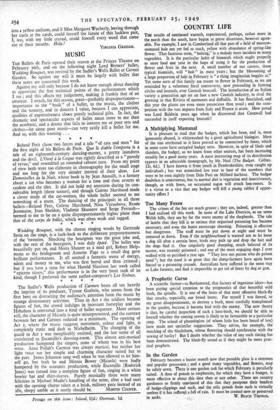MUSIC
THE Ballets de Paris opened their season at the Princes Theatre on February r6th, and on the following night Lord Berners' ballet, Wedding Bouquet, was revived by the Sadler's Wells Ballet at Covent Garden. So against my will it must be largely with ballet that these notes are concerned this week.
Against my will only because I do not know enough about dancing to appreciate the fine technical points of the performances which I see ; and this affects my judgement, making it frankly that of an amateur. I attach, for this reason, great—probably disproportionate— importance to the " book " of a ballet, to the music, the clothes and the scenery, and in dancers I value, because I can appreciate, qualities of expressiveness above purely technical gifts. In fact, the dramatic and spectacular aspects of ballet mean more to me than the acrobatic, and a drama that fails to interest me or poor sets and clothes—let alone poor music—can very easily kill a ballet for me. And so, with this warning . . .
Roland Petit chose two farces and a tale "of cats and men" for the first night of his Ballets de Paris. Que le diable remporte is a tale of an eighteenth-century dancing-master, a pretty laundress and the devil. L'Oeuf a la Coque was rightly described as a " parody of revue," and resembled an extended cabaret turn. From my point of view both were too elaborate in choreography for the small stage and too long for the very slender interest of their ideas. Les Demoiselles de la Nuit, whose book is by Jean Anouilh, is a fantasy about a cat who becomes a woman for a time and then reverts to catdom and the tiles. It did not hold my attention during its con- siderable length (three scenes), and though Colette Marshand made a clever study of the cat-woman, the whole ballet seemed to me something of a stunt. The dancing of the principals in all three ballets—Roland Petit, Colette Marchand, Nina Vyroubova, Renee Jeanmaire, Joan Sheldon, Vladimir Skuratov and Serge Perrault— seemed to me to be on a quite disproportionately higher plane than that of the corps de ballet, which was often weak and ragged.
* * * * Wedding Bouquet, with the chorus singing words by Gertrude Stein on the stage, is a hark-back to the deliberate preposterousness of the 'twenties. Shocking the bourgeois was the great joke and, with the rest of the bourgeois, I was duly Owe. The ballet was beautifully put on, and Moira Shearer as a mad girl, Robert Help- mann as the bridegroom and Annette Page as a small dog gave brilliant performances. It all seemed a fantastic waste of energy, talent and money to me, who was first bored and then Irritated ; but if you have a taste for what Harold Nicolson last week called " epicene titters," this performance is in the very front rank of its kind, though I preferred the same author-composer's Les Sirenes. * * * * The Sadler's Wells production of Carmen bears all too heavily the imprint of its producer, Tyrone Guthrie, who seems from the first bent on distracting the audience's attention from the music by strange diversionary activities. Thus in Act r the soldiers became figures of fun, the crowd indulges in incessant horseplay and the Habafiera is converted into a kind of ballet sequence. More serious still, the character of Micaela is quite misrepresented, and the contrast between her and Carmen reduced to a minimum. The opening of Act 2, where the music suggests movement, colour and light, is completely static and dark as Niebelheim. The changing of the guard in Act r was inexplicably omitted, and the last scene of all transferred to Escamillo's dressing-room. This almost anti-musical production hampered the singers, none of whom was in his best voice. Anna Pollak's Carmen was always musical, but neither her light voice nor her simple and charming character suited her to the part. James Johnston sang well when he was allowed to let him- self go, but both he and Minnia Bower (Micaela) were badly hampered by the eccentric production, while Escamillo (Roderick Jones) was turned into a complete figure of fun, singing in a white bowler hat and shirt-sleeves. Purely musically there were many felicities in Michael Mudie's handling of the score, after a bad start with the opening chorus taken at a brisk, military pace instead of an
idle, sleepy amble as it surely should be. MARTIN COOPER.


































 Previous page
Previous page